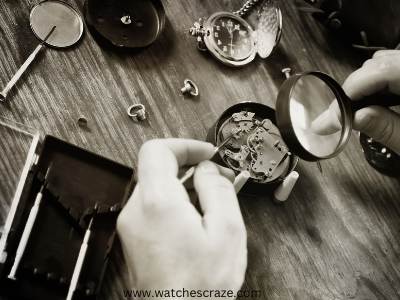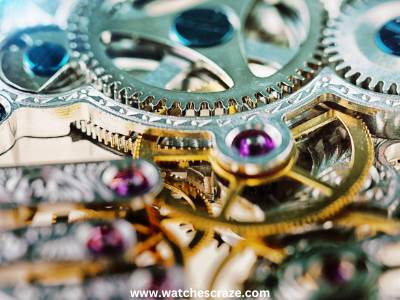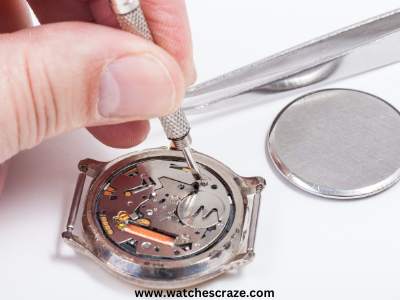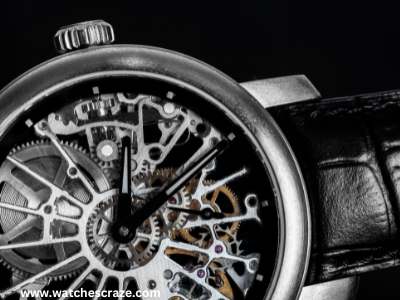Why Are Jewels Used in Watches
Ever seen the shiny stones in some watches? This is just not to please your eyes. They have a duty. These gemstones help watches work better and longer while ensuring their dependability is not questioned at all. Whether it’s a vintage or a modern watch, the utilization of jewels in timepieces aims at improving their performance. So let us look closely; why are jewels more than sparkly things- they are must-haves for timekeeping.
What Are Jewels in Watches?

Do you notice those tiny shiny objects inside some watches? These are referred to as “jewels”. However, these aren’t the usual costly stones like diamonds or pearls. No, usually they are small rubies or sapphires and they aren’t there without reason. You see these jewels have an obligation! They act like secret workers within the watch making sure everything goes smoothly on both ends. They are placed where moving parts need to slide past each other and their smooth surface helps minimize frictional wear of rubbing surfaces. So next time you peer into one of those glimmers, know that it’s not just for show but rather your quiet heroes saving your watch from breaking down on you when least expected through slickness alone!
How Jewels Make Watches Work Better

When we talk about jewels in watches, we’re not chatting about sparkly gems just for looks. Nope, these jewels, usually made from special materials like rubies or sapphires, actually help watches work better. Here’s how:
-
Less Friction:
Think of a watch like a tiny bustling town, with gears and springs always moving around. Now, in any city, there will be some rubbing and bumping. That’s where jewels come in handy. They act like super-smooth roads, letting those tiny gears slide past each other without getting stuck. This means the watch can keep ticking smoothly and always tell the right time.
-
Lasting Longer:
Watches become like our ever-reliable companions through thick or thin. But with poor maintenance, they could wear out much faster than we would want. Just like armor covers the most important parts in a battle so do the jewelry on watches when it comes to slowing down its wearing rate.
Why Jewels Aren’t Just for Looks
- Jewels work like little slick pathways, helping parts move without getting stuck or slowing down.
- They’re super tough, protecting delicate bits from wearing out too fast.
- By keeping things moving smoothly, jewels help the watch stay right on time.
- Watches with jewel bearings tend to be more durable due to their ability to resist everyday wear and tear better.
- With the inclusion of jewel bearings into your model, there is less likelihood that you will run out of time on your day-to-day engagements thus making it a long-term companion.
The Importance of Jewels in Modern Watches

-
Smooth Moves:
Jewels help parts in modern watches move smoothly, like greasing the wheels of a bicycle. Without them, things might grind and get stuck.
-
Toughness Matters:
These jewels are super tough, like armor for your watch. They protect the important bits from wearing out too fast, so your watch lasts longer.
-
Right on Time:
With jewels, watches keep better time. They help reduce any wobbles or jolts that could throw off the clock, making sure it’s always accurate.
-
Built to Last:
Watches with jewels are like sturdy workhorses. They can handle all the bumps and knocks of everyday life, sticking around for years without giving up.
-
Always Dependable:
You can trust a watch with jewels. They’re less likely to break down or act up, so you can rely on them to keep ticking away without any surprises.
Conclusion

So, about those jewels in watches? They’re not just pretty ornaments—they’re the engine behind the smooth tick-tock of your watch. Picture them as the silent helpers, making sure everything works like magic. Next time you peek inside your watch, remember, that those shiny bits aren’t just for show—they’re the real heroes keeping your timepiece in top shape. And they’re not your average gems either—they’re the reliable pals that make your watch sturdy and dependable. So, give a nod to those jewels when you glance at the time—they’re the unsung champions of the watch world!
FAQs: Why Are Jewels Used in Watches
How many jewels in a watch is good?
A mechanical watch that has approximately 17 to 25 jewels is generally regarded as good for maintaining optimum performance and durability.
Why do mechanical watches have jewels?
Jewels used in the construction of mechanical watches are synthetic versions of rubies or sapphires, which reduce friction between the moving parts of a watch, enabling it to move freely and last longer.
What are watch jewels made of?
Watch jewels usually take the form of man-made ruby or sapphire. These materials have been chosen for their qualities such as hardness, smoothness, and ability to resist wear; these features make them ideal as low-friction surfaces on which parts can slide in a mechanical wristwatch.




